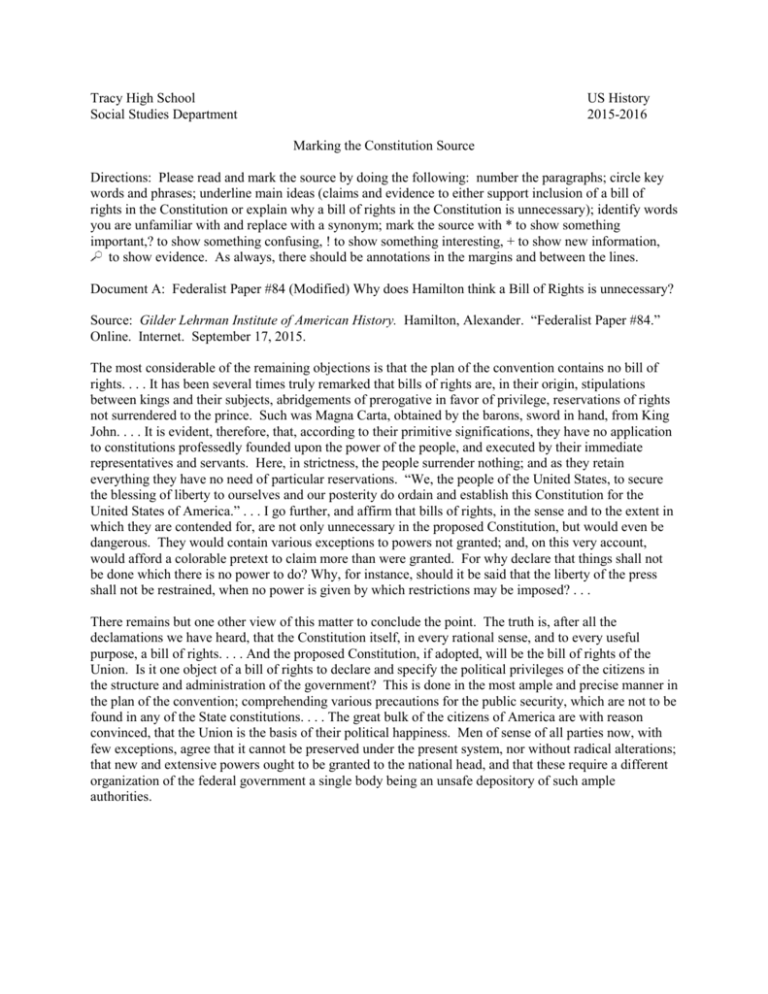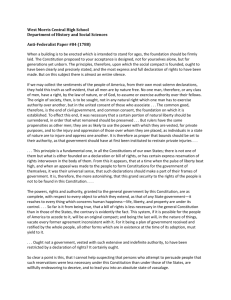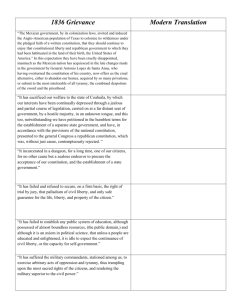Tracy High School US History Social Studies Department 2015
advertisement

Tracy High School Social Studies Department US History 2015-2016 Marking the Constitution Source Directions: Please read and mark the source by doing the following: number the paragraphs; circle key words and phrases; underline main ideas (claims and evidence to either support inclusion of a bill of rights in the Constitution or explain why a bill of rights in the Constitution is unnecessary); identify words you are unfamiliar with and replace with a synonym; mark the source with * to show something important,? to show something confusing, ! to show something interesting, + to show new information, to show evidence. As always, there should be annotations in the margins and between the lines. Document A: Federalist Paper #84 (Modified) Why does Hamilton think a Bill of Rights is unnecessary? Source: Gilder Lehrman Institute of American History. Hamilton, Alexander. “Federalist Paper #84.” Online. Internet. September 17, 2015. The most considerable of the remaining objections is that the plan of the convention contains no bill of rights. . . . It has been several times truly remarked that bills of rights are, in their origin, stipulations between kings and their subjects, abridgements of prerogative in favor of privilege, reservations of rights not surrendered to the prince. Such was Magna Carta, obtained by the barons, sword in hand, from King John. . . . It is evident, therefore, that, according to their primitive significations, they have no application to constitutions professedly founded upon the power of the people, and executed by their immediate representatives and servants. Here, in strictness, the people surrender nothing; and as they retain everything they have no need of particular reservations. “We, the people of the United States, to secure the blessing of liberty to ourselves and our posterity do ordain and establish this Constitution for the United States of America.” . . . I go further, and affirm that bills of rights, in the sense and to the extent in which they are contended for, are not only unnecessary in the proposed Constitution, but would even be dangerous. They would contain various exceptions to powers not granted; and, on this very account, would afford a colorable pretext to claim more than were granted. For why declare that things shall not be done which there is no power to do? Why, for instance, should it be said that the liberty of the press shall not be restrained, when no power is given by which restrictions may be imposed? . . . There remains but one other view of this matter to conclude the point. The truth is, after all the declamations we have heard, that the Constitution itself, in every rational sense, and to every useful purpose, a bill of rights. . . . And the proposed Constitution, if adopted, will be the bill of rights of the Union. Is it one object of a bill of rights to declare and specify the political privileges of the citizens in the structure and administration of the government? This is done in the most ample and precise manner in the plan of the convention; comprehending various precautions for the public security, which are not to be found in any of the State constitutions. . . . The great bulk of the citizens of America are with reason convinced, that the Union is the basis of their political happiness. Men of sense of all parties now, with few exceptions, agree that it cannot be preserved under the present system, nor without radical alterations; that new and extensive powers ought to be granted to the national head, and that these require a different organization of the federal government a single body being an unsafe depository of such ample authorities. Directions: Please read and mark the source by doing the following: number the paragraphs; circle key words and phrases; underline main ideas (claims and evidence to either support inclusion of a bill of rights in the Constitution or explain why a bill of rights in the Constitution is unnecessary); identify words you are unfamiliar with and replace with a synonym; mark the source with * to show something important,? to show something confusing, ! to show something interesting, + to show new information, to show evidence. As always, there should be annotations in the margins and between the lines. Document B: Anti-Federalist Paper #84 (Modified) Why does Brutus feel a Bill of Rights is necessary? Source: Gilder Lehrman Institute of American History. Brutus (likely Robert Yates). “Anti-Federalists Paper #84.” Online. Internet. September 17, 2015. When a building is to be erected which is intended to stand for ages, the foundation should be firmly laid. The Constitution proposed to your acceptance is designed, not for yourselves alone, but for generations yet unborn. The principles, therefore, upon which the social compact is founded, ought to have been clearly and precisely stated, and the most express and full declaration of rights to have been made. But on this subject there is almost an entire silence. From this it appears, that at a time when the pulse of liberty beats high, and when an appeal was made to the people to form Constitutions for the government of themselves, it was their universal sense, that such declarations should make a part of their frames of government. It is, therefore, the more astonishing, that this grand security to the rights of the people is not to be found in this Constitution. . . . The powers, rights and authority, granted to the general government by this Constitution, are as complete, with respect to every object to which they extend, as that of any State government—it reaches to everything which concerns human happiness—life, liberty, and property are under its control. . . . So far is it from being true, that a bill of rights is less necessary in the general Constitution than in those of the States, the contrary is evidently the fact. This system, if it is possible for the people of America to accede to it, will be an original compact; and being the last will, in the nature of things, vacate every former agreement inconsistent with it. For it being a plan of government received and ratified by the whole people, all other forms which are in existence at the time of its adoption, must yield to it. . . . Ought not a government, vested with such extensive and indefinite authority, to have been restricted by a declaration of rights? It certainly ought. So clear a point is this, that I cannot help suspecting that persons who attempt to persuade people that such reservations were less necessary under this Constitution that under those of the States, are willfully endeavoring to deceive, and to lead you into absolute state of vassalage.









